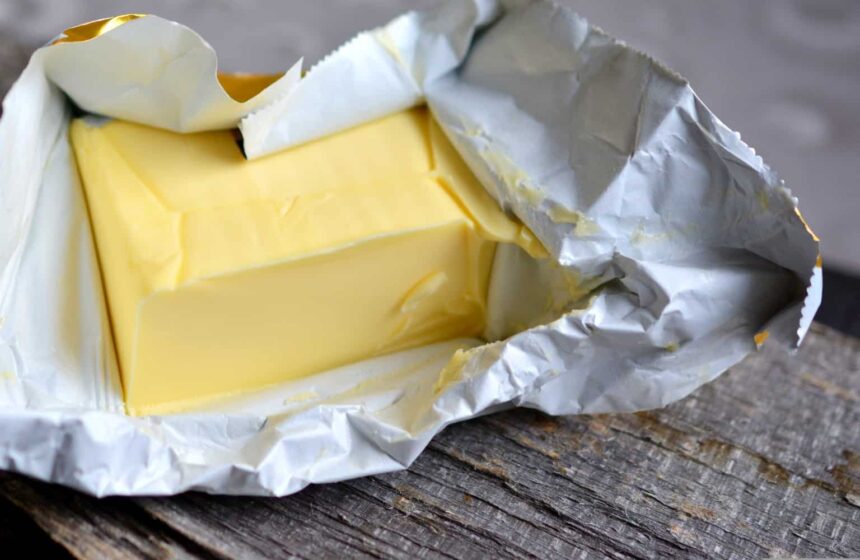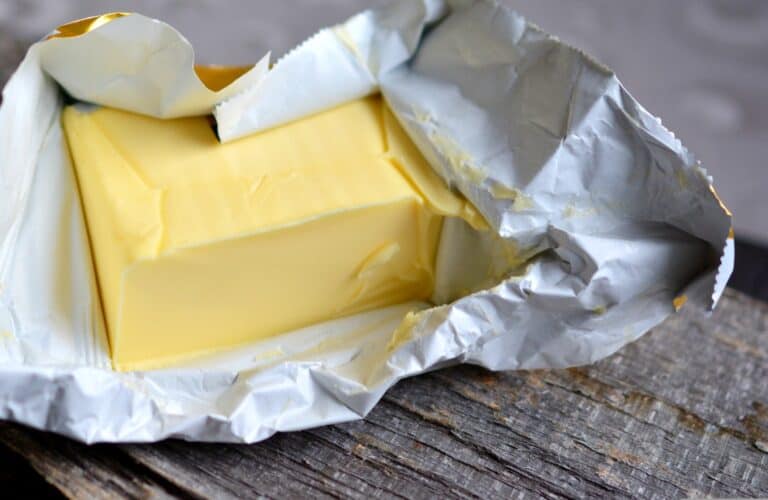
You most likely currently understand enough to understand that house fires are absolutely devastating, and among the most common disasters that can befall people.

You might likewise understand that most home fires begin in or around the cooking area. It makes good sense, high heat, combustible substances, one incident or error and the rest is history.
How about something as basic and ubiquitous as butter? Is butter flammable?
No, butter is not flammable because it has too much water. However, if overcooked butter can potentially ignite once the water vaporizes.
Everybody knows that you can burn butter, which’s true, however that really refers to destroying the butter from overheating and cooking it too long.
That said, it is possible to boil away the water in butter and leave behind fat which can possibly catch fire in particular scenarios, although this is not likely.
Keep reading and I’ll inform you everything else you need to know about it.
Is Butter Flammable?
No, it isn’t. Concerning combustible materials, it’s necessary to comprehend the distinction in between combustible and flammable.
Flammable substances can ignite quickly at or near space temperatures, while flammable ones require higher temperature levels to ignite.
Butter does not fall under either of these classifications because it primarily includes fat and water, neither of which are naturally fire-friendly, you might say.
While butter can melt, obviously, and will even brown at high temperatures, it does not have the needed residential or commercial properties to be categorized as really combustible. For that reason, it isn’t thought about a fire danger in typical circumstances.
Does Butter Fire Up at Any Temperature level?
Possibly. While butter is not usually thought about combustible, it can fire up under certain conditions. The flashpoint, or the most affordable temperature level at which a compound can vaporize to form a combustible mixture in air, of butter is around 350 ° F.
Nevertheless, this presumes that the water content of the butter has actually already evaporated, leaving only the fats behind.
When heated up beyond this point, butter can possibly ignite. It deserves noting that this isn’t a normal occurrence and usually needs extended direct exposure to intense heat.
Does Butter React with Heat?
Yes, it does. Butter responds with high temperatures by in a number of distinct phases. Initially, as butter is exposed to heat, it begins to melt, transforming from a strong to a liquid state.
As the temperature level continues to increase, it starts to break down into its constituent parts: water, milk solids, and fat. The milk solids can then brown, imparting a nutty taste popular in some culinary applications.
However, if the heat heightens further, these same solids can begin to burn, releasing an unpleasant odor and taste.
In much more extreme heat, with the water material fully vaporized and continued exposure to high heat, the staying fats can catch fire.
When Butter Still Includes Water it Will Not Fire up
Butter is a mix of fat and water. For that reason, when it remains in a strong or semi-solid state, such as when it’s just been gotten rid of from the refrigerator, it won’t ignite.
This is because the water material in the butter dramatically lowers its ability to catch fire. Water has high heat capacity and need to be entirely evaporated before the butter’s fats can reach their ignition point.
As such, the presence of water in butter acts as a natural fire retardant, you may say.
Is Salted Butter Flammable?
Yes. While salted butter isn’t generally classified as combustible as detailed above, it does have the prospective to ignite under those same particular conditions.
The existence of salt does not considerably impact its combustion residential or commercial properties. However once again, this normally occurs only at high sustained temperatures and is not a typical incident in daily cooking.
Is Unsalted Butter Flammable?
Yes. Similar to its salted equivalent, unsalted butter is likewise not inherently flammable. However it too can ignite when subjected to high heat over a prolonged period.
When once again, this is extremely unlikely to take place in daily usage if you’re paying attention at all to what you’re doing at the stove.
Care: Butter Can Spark Quickly When Sprayed
There’s one circumstances where butter can ignite a lot more quickly than normal.
While strong or liquid butter isn’t flammable, this significant exception takes place when butter is aerosolized, as in the kind of spray butter or when utilizing a spritzer with melted butter.
Most misted liquids enable more effective heat transfer and thusly easier ignition.
This indicates that the tiny droplets of butter can reach their ignition point much faster than a strong or bulk liquid, and consequently spark their small surrounding beads in a huge domino effect.
Another negative result occurs from propellants utilized in mass-produced butter sprays and cooking sprays: these pressurized chemicals might themselves be highly flammable even if the butter they “carry” is not!
As a result, using spray butter of any kind near any possible source of ignition can pose a severe fire risk.
Exercise caution when spraying butter, particularly around open flames or hot surfaces. If you pre-heat your pans, be extra cautious!
Will Butter Make a Fire Worse?
No. Butter is not likely to exacerbate a fire. The high water content and low flash point make it a bad fuel source.
In truth, the water in butter tends to evaporate when exposed to heat, which can assist to cool off the immediate location and possibly sluggish or stop the spread an extremely small fire.
But don’t get things too twisted: tossing butter into an existing fire is not an advised approach of fire suppression and could result in unforeseeable results!
Is Butter Reactive with Other Compounds?
No. In general, butter does not react with other substances to create a dangerous condition or boost fire risk. Butter is reasonably steady and doesn’t easily take part in chemical reactions with other typical substances.
It’s worth noting, however, that butter can blend with other flammable compounds, possibly modifying their combustion homes.
Still, this does not inherently make the situation more hazardous, as the behavior of this mix would mostly depend upon the other compound involved.
How Should You Handle Butter Exposed to Fire?
If butter has ignited, it’s essential to deal with the scenario properly to avoid the spread of flames. If the fire is in a pan, just cover it with a metal cover to smother it by cutting off the oxygen supply.
If the fire is big or already threatening to go out of control, get an extinguisher: the suitable one for such an occasion is ranked for Class B or Class K fires, or pick an ABC-rated extinguisher.
Class B extinguishers are designed for combustible liquid fires, while Class K extinguishers are particularly planned for kitchen area fires involving cooking oils or fats.
ABC-rated extinguishers are versatile models that can deal with most kinds of common fires. But always keep in mind that you need to never hang in there too long attempting to eliminate a fire that has actually gone out of control.
Get you and your household out, and call the fire department: absolutely nothing in your house is worth your life.

